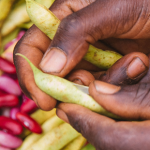Agriculture is extremely important to Cambodia, representing at least one-third of the nation’s gross domestic product and providing employment to around 60 percent of the labor force. It is perhaps the most sensitive sector to changes in climate, with higher temperatures stressing plants, livestock, and workers, and rainfall variation through droughts and floods leading to crop losses and food insecurity. While it is important to consider the impact of climate change on agricultural production, it is also important to consider other cross-cutting issues to achieve the goals of Feed the Future and the Global Food Security Strategy—especially gender and nutrition. This policy note summarizes assessments of these linkages in Cambodia under the Gender, Climate Change, and Nutrition Integration Initiative (GCAN).
For climate change, the American farmer is the sleeping giant
By Timothy Thomas The most recent National Climate Assessment found that temperatures across the United States have already risen by more than 1 degree on average due to climate change. So, if we’re already feeling the effects of climate change, why do so many Americans remain skeptical of it? Part of the reason may be that while […]
Policy Note on Climate Change, Gender and Nutrition Linkages – Research Priorities for Bangladesh
Climate change, coupled with high levels of poverty and population density, is a substantial threat to sustainable development in Bangladesh. Climate-related threats, such as flooding, inundation, salt-water intrusion, and changes in temperatures are increasing with climate change. Achieving the goals of Feed the Future and the Global Food Security Strategy requires careful consideration of the impact of relevant climate science on agricultural production, while at the same time considering other cross-cutting issues that influence agricultural growth, poverty alleviation, and resilience—especially gender and nutrition. This policy note summarizes assessments of these linkages in Bangladesh under GCAN.
Policy note on the interlinkages of Climate Change, Gender and Nutrition in Nigeria
Increasing temperature, erratic rainfall, and other extreme events, such as floods and droughts, pose severe threats to development in Nigeria. Climate change will have significant adverse impacts on crop production and livelihoods, making the country’s poor and disadvantaged people even more vulnerable. It is imperative that the impact of relevant climate science on agricultural production be considered, together with important cross-cutting issues that influence agricultural growth, poverty alleviation, and climate resilience—especially gender and nutrition—if the goals of Feed the Future and the Global Food Security Strategy are to be achieved. This policy note summarizes assessments of these interlinkages in the Nigerian context under GCAN.
Climate change and variability: What are the risks for nutrition, diets, and food systems?
By Jessica Fanzo, Rebecca McLaren, Claire Davis, and Jowel Choufani
The paper uses a food systems approach to analyze the bidirectional relationships between climate change and food and nutrition along the entire food value chain. It then identifies adaptation and mitigation interventions for each step of the food value chain to move toward a more climate-smart, nutrition-sensitive food system. The study focuses on poor rural farmers, a population especially vulnerable to the adverse effects of climate change on nutrition, although we recognize that there are other vulnerable populations, including urban poor and rural populations working outside of agriculture. Although this report does not explicitly exclude overweight and obesity, it focuses primarily on undernutrition because this nutritional status is currently more prevalent than overnutrition among our target population.
- « Previous Page
- 1
- 2
- 3
- 4
- …
- 13
- Next Page »




